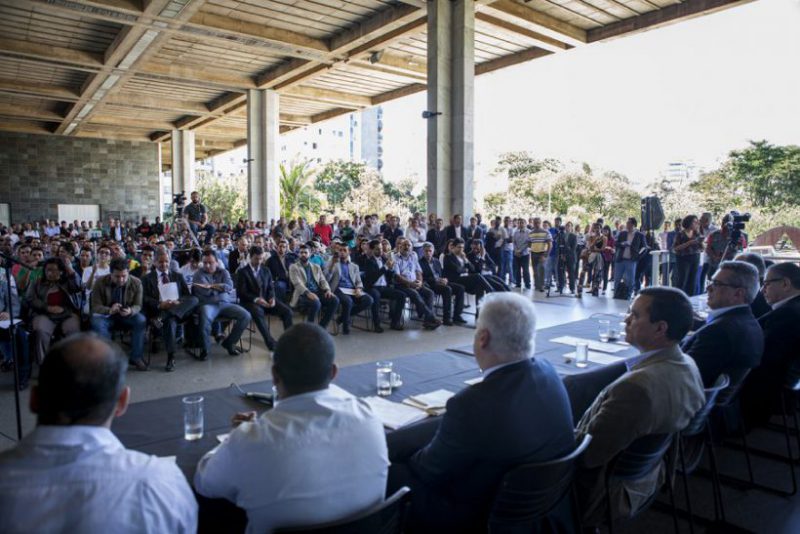23/05/2017

The restart of Samarco’s operations, which have been paralyzed for a year and a half, was discussed on Tuesday (May, 5th), during a Public hearing of the Economic Development Committee of the Legislative Assembly of Minas Gerais in Belo Horizonte. The meeting was attended by about 400 people (among deputies, mayors, Samarco employees, suppliers, businessmen and civil society entities) and expressed the concern about the uncertainty regarding the date of the resumption of the miner’s activities. The consequent impacts on economic activity and the level of employment were also discussed.
The president of the Economic Development Committee, the Deputy Mr. Roberto Andrade, defended the restart of Samarco. ”As president of the Economic Development Commission, I have the duty to seek public policies that foster the development of the state in a sustainable manner and with respect to the labor and environmental legislation; a commitment that I will never give up” said Roberto Andrade. “However, in order Samarco to repair the damages of the accident, I understand that the restart of company’s work is indispensable. Mining is a vital activity for the economy of many municipalities that, after the interruption of Samarco’s operations, had a fall in their revenues, which generated both unemployment and a lack of public resources.”
“There are many uncertainties. The resumption not only depends on the company’s negotiations but also on responses from other players. This scenario interferes in the lives of our employees and their families, in the suppliers and customers’ business perspectives, and is compromising the economy of several municipalities of Minas Gerais And Espírito Santo, “ said Roberto Carvalho, Samarco’s president, during the hearing.
He reminded that, shortly after the Fundão dam burst in November 2015, Samarco put its efforts on emergency actions, focusing on humanitarian assistance and remediation of environmental impacts. “We also focused on reinforcing the remaining structures of the dam complex and we reviewed our emergency action plan. We have made the warning system and the dam monitoring center more robust.”
Roberto Carvalho affirmed that the repair actions as well as the socio-economical and socio-environmental compensations are still in progress and under the Renova Foundation’s control. The Foundation was created by the Term of Transactions of Conduct Adjustment (TTAC) signed in March 2016 by Samarco, its shareholders and the federal governments of the states of Minas Gerais and Espírito Santo. In 2016, Samarco invested R$ 2 billion in repair and compensation actions.
The mayor of Mariana (MG), Duarte Eustáquio Gonçalves Júnior, reminded that 89% of Mariana’s revenue comes from the mineral activity and defended the return of Samarco’s operations. “We cannot hold more” said the mayor, who alerted about the growth of unemployment rate in the city. “What we need is these licenses to be reviewed,” he said.
The mayor of Anchieta (ES), Fabrício Petri, where Samarco has its pelletizing plants, also supported the restart of Samarco’s operations. According to Petri, the city experienced a drop in its revenues after the company’s shutdown and had to re-adjust the public services.
Licensing procedures for the restart of the operations
In June 2016, in the State Department of the Environment and the Sustainable Development of Minas Gerais (Semad), Samarco filed an environmental impact study regarding the tailing disposal system of the “Cava de Alegria Sul”. It is a confined space, without any connection to the dam area. After granting the license, Samarco will need five months to prepare the site.
The Corrective Operational License (LOC) of the existing structures at the Germano complex in Mariana is the other necessary authorization that Samarco needs, in order to restart its operations. The LOC was required by the Semad right after the suspension of all Samarco licenses in October 2016.
However, Samarco still depends on a statement of compliance from the existing water collection station in Santa Barbara to file the LOC with the Semad. This municipality conditioned the delivery of the declaration document to the environmental counterparts, but a recent decision of the Court of Justice of Minas Gerais determined that only the land use and occupation legislation should be taken into account. The prefectures of Mariana, Ouro Preto, Matipó and Catas Altas already granted the document.